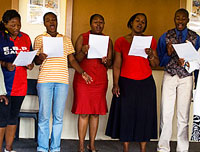Amazing Grace project finds South African solidarity
Ali Symons
General Synod Web Writer

Staff from the John Wesley Community Centre in Etwatwa, South Africa, sing "Amazing Grace."
Down a dusty dirt road, past a barbed wire fence, inside a simple brick building, a group of eight men and women sing the hymn “Amazing Grace.” They sing soulfully—slowly but loud, and with big smiles.
The scene is just outside of Johannesburg, South Africa, and the singers are caregivers to HIV/AIDS-affected children at the John Wesley Community Centre, which Canadian Anglicans support through the Primate’s World Relief and Development Fund (PWRDF). As the John Wesley staff put it, they have seen many stories of amazing grace: children fed, the sick cared for, women empowered.
Stories like this are why three General Synod staff members are travelling in South Africa from Sept. 27 to Oct. 12. Lisa Barry, senior producer for Anglican Video, Beverley Murphy, circulation manager for the Anglican Journal, and this writer are collecting stories from the amazing projects that Canadian Anglicans support.
Along the way, we have found many South Africans keen to sing “Amazing Grace” in solidarity with the Amazing Grace Project, a General Synod initiative that encourages all Canadian Anglicans to come together in song on Nov. 23.
“Whenever we tell people about the Amazing Grace Project, they think it’s a great idea,” said Ms. Murphy. “It’s a fundraiser to support northern Canadian dioceses through the Council of the North, so they’re interested in that. Also we also find that the hymn resonates with so many people.”
Against the backdrop of contemporary South Africa—liberated from the racial segregation of apartheid, but struggling with economic injustice and HIV/AIDS—the hymn “Amazing Grace” certainly resonates in unique ways.
“The song means a lot to me,” said Joyce Vumazonke, one of the John Wesley singers. “Because God is amazing. His grace is amazing. Whenever we’re seeing difficulties, we know we shall overcome.” Ms. Vumazonke, a motherly woman with sparkling eyes, cares for people with HIV/AIDS, bathing them, feeding them, and tending to their gardens.
Earlier that week, the General Synod team saw more renditions of “Amazing Grace.” A choir at St. John the Baptist Anglican Church, Riverlea, heard about the Amazing Grace Project and led the congregation in a lively version. St. John’s neighbourhood was designated a “coloured” area during apartheid, for people whose ethnicity could not be classified as Black or White. After apartheid ended, this neighbourhood slowly became more racially integrated, and the church demographics—including the choir that sang “Amazing Grace”—are reflecting this change.
Later that afternoon, we attended the annual youth event for the Diocese of Christ the King. Around 150 young people gathered at a high school for some fiercely enthusiastic dancing, drumming, praying, and testifying. Afterwards, they obliged their Canadian guests with a cappella version of “Amazing Grace” as a closing hymn.
Finally there was the performance at St. Martin’s School, the alma mater of Archbishop Emeritus Desmond Tutu, who was instrumental in bringing an end to apartheid. The General Synod team was shown around the school by cheerful Anglican nuns, Sister Eunice and Sister Maureen, and then happily pulled out the cameras when the school organist played an impromptu rendition of “Amazing Grace” in the old chapel.
There may be more of these “Amazing Grace” stories when the team travels next to Cape Town for the World Association of Christian Communication Congress. Watch for these videos soon on the Amazing Grace Project website. They will be inspiring resources both for Nov. 23 ideas, and to remind us that wherever the hymn is sung, God’s amazing grace is there also.
Use this story in your newspaper or newsletter:
- Story in Microsoft Word format

- Photo.
Please use credit: "Ali Symons/Anglican Church of Canada"
Caption: "Staff from the John Wesley Community Centre in Etwatwa, South Africa, sing "Amazing Grace.""- High resolution photo (1.1MB - 300 dpi - JPEG)
- Low resolution photo (72 dpi - JPEG)

